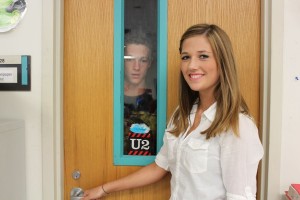She’s not just bilingual or trilingual. She’s multilingual.
Morgan Noll, junior, is studying four languages.
Noll’s first language is English, but she also studies French, Spanish, and Arabic. She began studying French in middle school and said she enjoyed the process so much she wanted to do it again, this time with two more languages.
“I’ve always loved languages, so why not learn two more?” Noll said.
Noll plans to study each in college, so she wanted to get a jumpstart in Spanish and Arabic. She studied basic Spanish material on her own last summer, passed the Spanish II exam, and entered Spanish III at MHS this year.
She also is studying Arabic at Webster University. Noll said French and Spanish have cognates (words that sound like their English translations) and the same sentence structure, but Arabic is completely different. Not only does it have a new alphabet, she said, but the sentence structure is reversed.
Her best study method is making flashcards or writing the word over and over until it’s memorized, she said. She sometimes confuses Spanish and French, she said, but Arabic doesn’t usually interfere.
Noll said Arabic words are entirely based on roots. For example, she said, if you know the root word for swim, you can usually just add on the common endings and you’ll know almost every word related to that topic. The problem: there are a lot of root words to learn.
Noll enjoys language, but she said she also enjoys learning about different cultures.
“Arab culture is the most shocking,” Noll said.
She said the culture is very hospitable, and people are expected to give the best of what they own to houseguests. Noll said if a stranger knocks on the door and asks for help, the family is expected to do so.
Noll does have another reason, besides enjoying the process, for learning so many languages. Her career path involves international affairs, and therefore, multiple languages. She said she is considering studying international political science or international political affairs.
Whether or not her career field requires her being multilingual, Noll said she just likes learning languages.
“I’d like to keep going and learn more after these,” Noll said.
Della Thompson, French teacher, said Noll is a motivated and hardworking student.
“She’s fun to teach,” Thompson said. “She gets excited about the language.”
Thompson said one benefit of learning multiple languages is the brain develops and becomes more flexible. She said learning a language is like being an athlete, because you “practice, practice, practice.” She also asks why if athletes play more than one sport, students don’t study more than one language.
Thompson also said learning about different cultures is another benefit of studying a new language.
“The world gets smaller,” Thompson said.
Monica Newsam, Spanish teacher, said knowing more than one language, even if you don’t speak them fluently, provides a broader perspective of the world.
She said the world is continually growing more globalized and interconnected, especially with communications.
“The concept of living in your own bubble no longer exists,” Newsam said. “We are all connected.”



